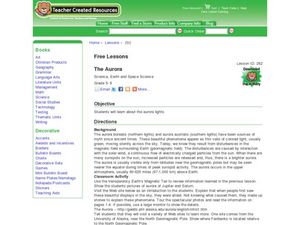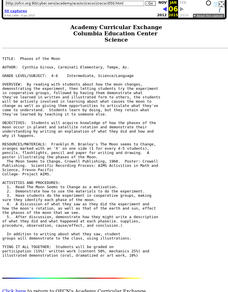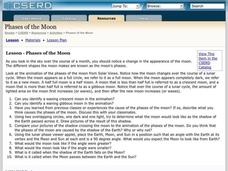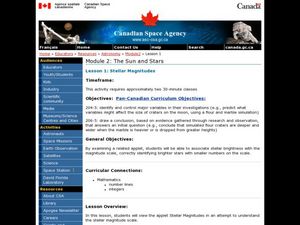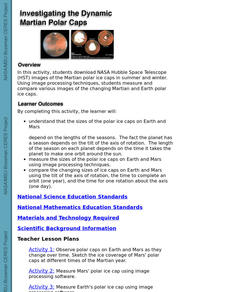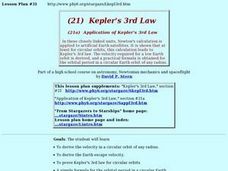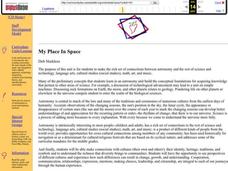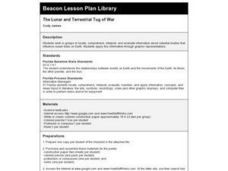Curated OER
Newton's Laws
Students give examples of each of Newton's three laws as they occur in everyday experiences. They visually represent and differentiate the difference between a direct proportion and an inverse proportion. Students explain how the...
Curated OER
Try This On For Size!
Students view a video to gather information about our solar system. They create models of the planets to scale and place them in scale relative to their distances from the sun. They also visit a planetarium or use the internet to gather...
Curated OER
The Solar System
In this solar system learning exercise, students complete a word puzzle by determining the terms associated with the 10 statements about the planets.
Curated OER
Retrograde Motion of Mars
Students investigate the motion of Mars. In this space science lesson, students use transparencies to trace the path of Mars through constellations. Students discuss the characteristics of the planet.
Curated OER
The Aurora
Students study the Aurora Borealis lights known commonly as the Northern and Southern lights. In this space science instructional activity, students study pictures of the Auroras for Jupiter and Saturn. Students visit the given website...
Curated OER
Phases of the Moon
Students research and identify the phases of the moon. They consider the moon's rotation, as well as that of the earth and sun. They write a description of their research and present it to the class.
Curated OER
Trouble in the Troposphere
Students create graphs using NASA data, compare ozone levels of several U.S. cities, analyze and evaluate the data and predict trends based on the data, and discuss and describe how human activities have modified Earth's air quality.
Curated OER
Cold Fronts And Warm Fronts
Students simulate the movement of cold and warm fronts as they listen to a story about the weather and Mr. Sun. They brainstorm the characteristics of each type of front then write about which front they would prefer if they were a...
Curated OER
Temperature Changes: Atmosphere & Ocean
Students observe temperature differences of water and air in sunlight and darkness. They determine that the sun warms the Earth's surface, which controls global currents and climate, keeping the earth habitable. They discover water and...
Curated OER
Create a Food Chain
Learners explore the food chain and the ways that animals depend on each other and on plants for food. They create a paper chain with different colors relating to carnivores and herbivores. The chains are linked to the sun to create a...
Curated OER
Phases of the Moon
Students create a model of the phases of the Moon by giving students pictures of the phases of the Moon, a picture of the Earth, and a picture of the Sun. They then take a picture, and stand in correct place to make the phases of the...
Curated OER
Plant Power
Seventh graders discuss the role of plants on Earth's biological system. In this life science instructional activity, 7th graders explain the process of transpiration and its importance in establishing Earth's climate patterns.
Curated OER
The Moon
Students explore the relationship between the earth, sun, and moon in our solar system. They create a moonrise/moonset chart, perform a dance that models the moon phases, and create a Styrofoam model of the moon's surface.
Curated OER
The Toilet Paper Solar System
Students classify the planets in the solar system, study planetary objects, and measure the relative distance between planets. In this solar system lesson, students use toilet paper to complete a scale model of the distance between the...
Curated OER
Stellar Magnitudes
Middle schoolers analyze the stellar magnitude scale. In this stellar magnitude lesson, students examine the stellar magnitude scale. Middle schoolers predict the Sun's magnitude from various planets.
Curated OER
The No Zone of Ozone
Pupils explore the causes and effects of the Earth's ozone holes through discussion and an interactive simulation. Using gumdrops and toothpicks, they conduct a large-group, interactive ozone depletion model.
Curated OER
Stellar Lunar Curriculum
Learners engage in a lesson that covers the concept of different phases of the moon. They name the cycles of the phases of the moon while using flashlights to simulate the light of the sun. They research information about several...
Curated OER
Investigating the Dynamic Martian Polar Caps
Students download NASA Hubble Space Telescope images of the Martian polar ice caps in summer and winter, and measure and compare various images of the changing Martian and Earth polar ice caps.
Curated OER
Kepler's 3rd Law
Students derive the velocity in a circular orbit of any radius. They derive the Earth escape velocity and prove Kepler's 3rd law for circular orbits # A simple formula for the orbital period in a circular Earth orbit of given radius.
Curated OER
My Place In Space
The purpose of this unit is for young scholars to make the rich set of connections between astronomy and the rest of science and technology, language arts, cultural studies (social studies), math, art, and music.
Curated OER
Solar System
For this space science worksheet, students complete each statement with the correct word or phrase related to the solar system. Then they locate each of the planets in a word search that follows.
Curated OER
Spectral Surprise
Students create spectral colors. In this hands-on science lesson, students examine the electromagnetic spectrum as they follow steps to create a model that separates and displays light.
Curated OER
The Lunar and Terrestrial Tug of War
Fourth graders, in groups, locate, comprehend, interpret, and evaluate information about celestial bodies that influence ocean tides on Earth. They apply this information through graphic representations.
Curated OER
Bill Nye- The Atmosphere
For this science worksheet, students look for the words that fill the blanks to cover the concept of the atmosphere. The activity is meant to be a review.






